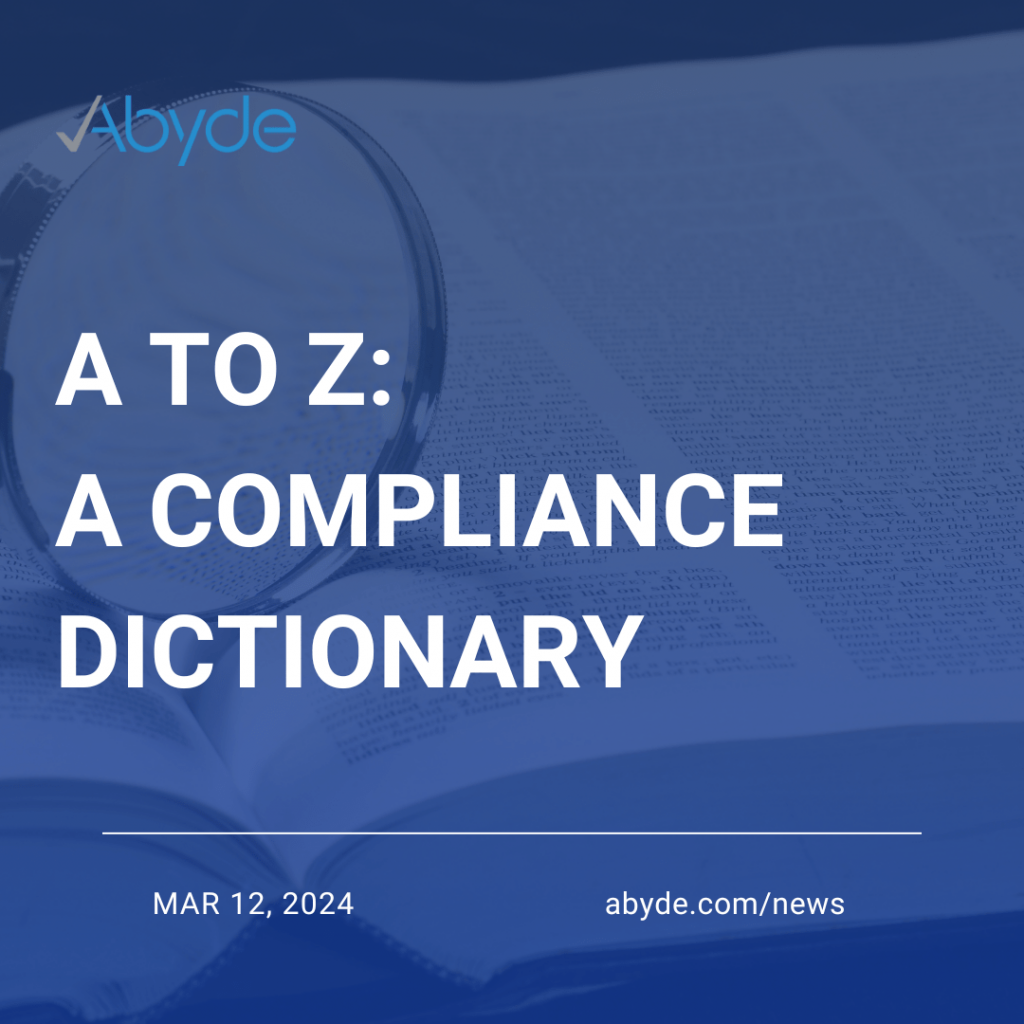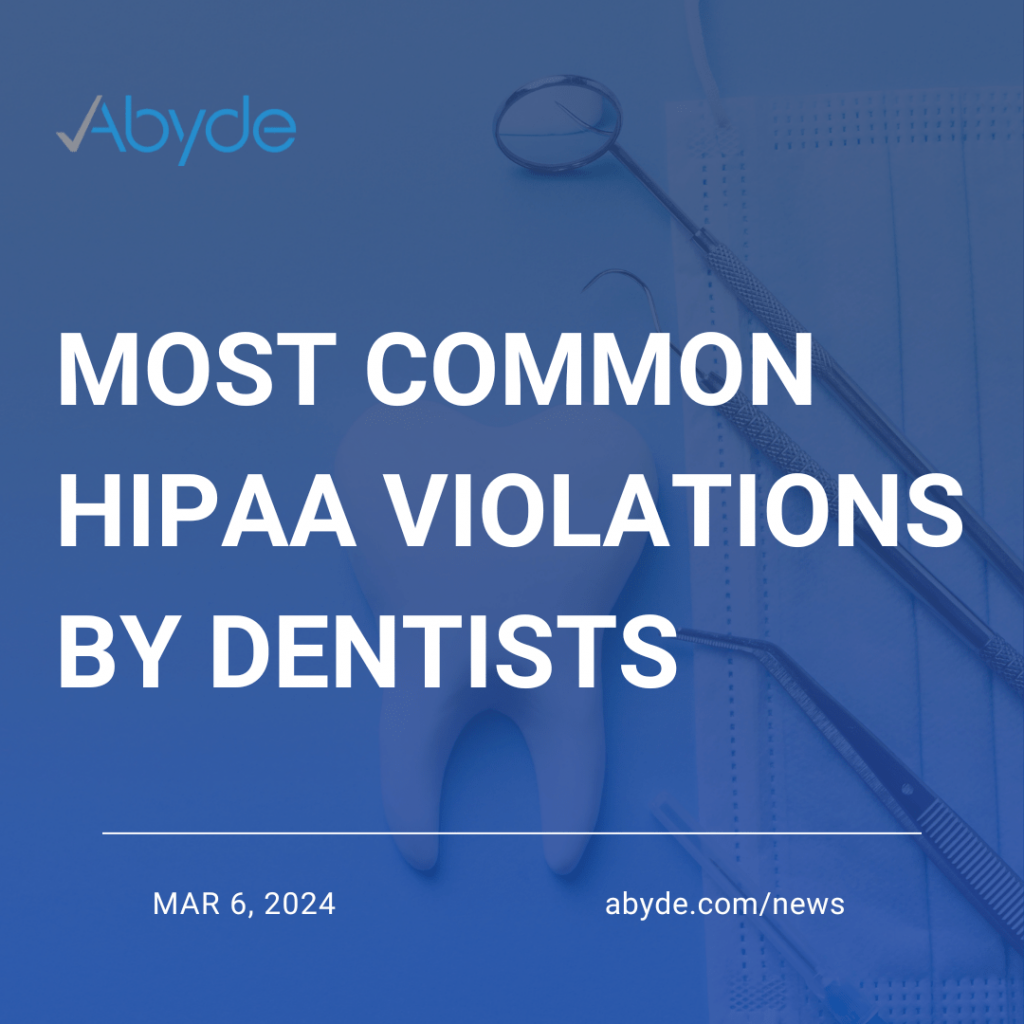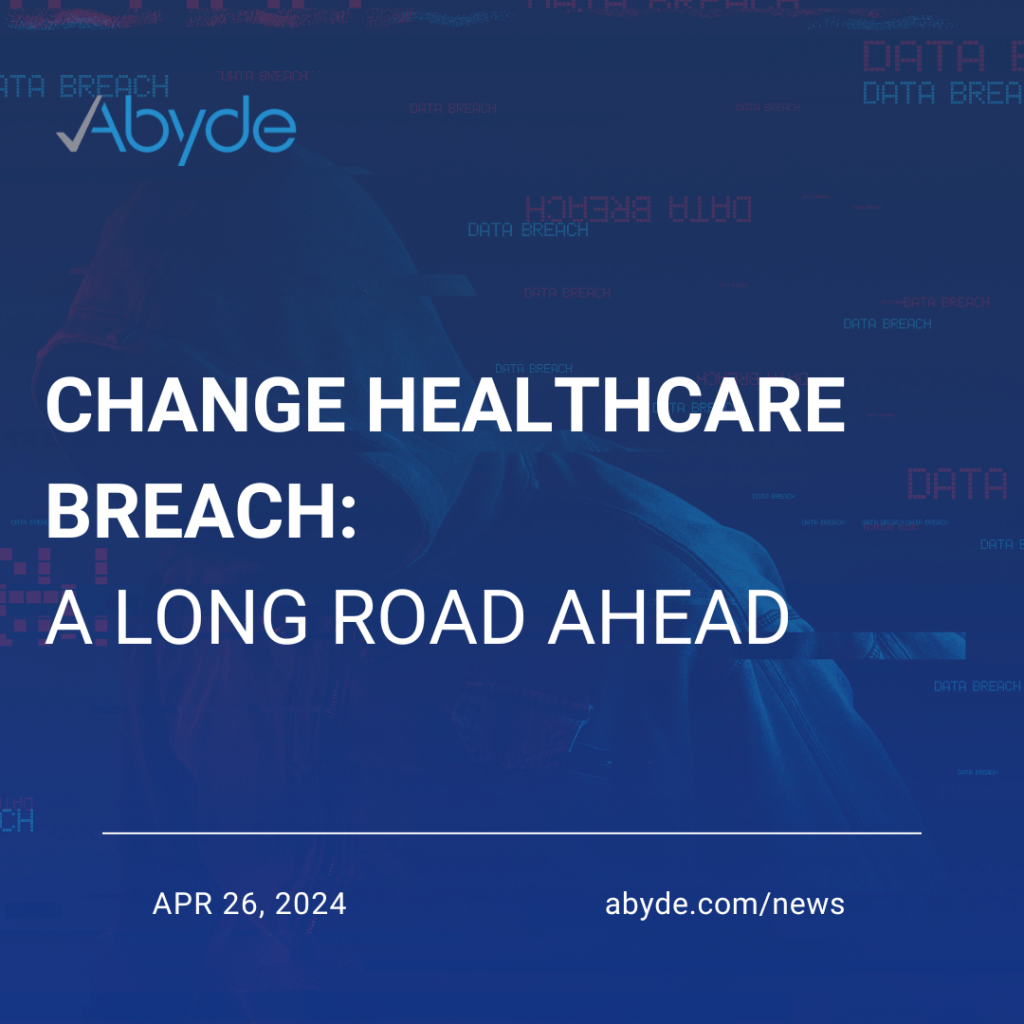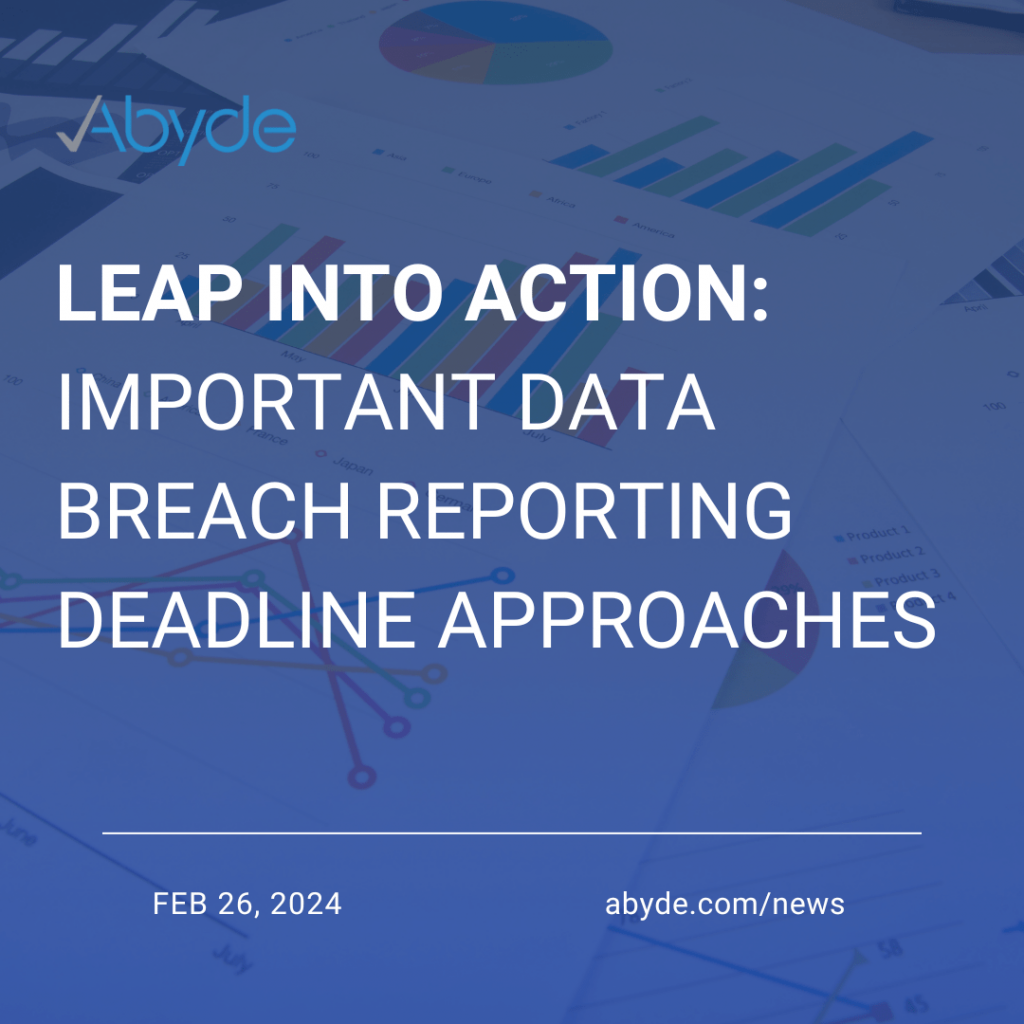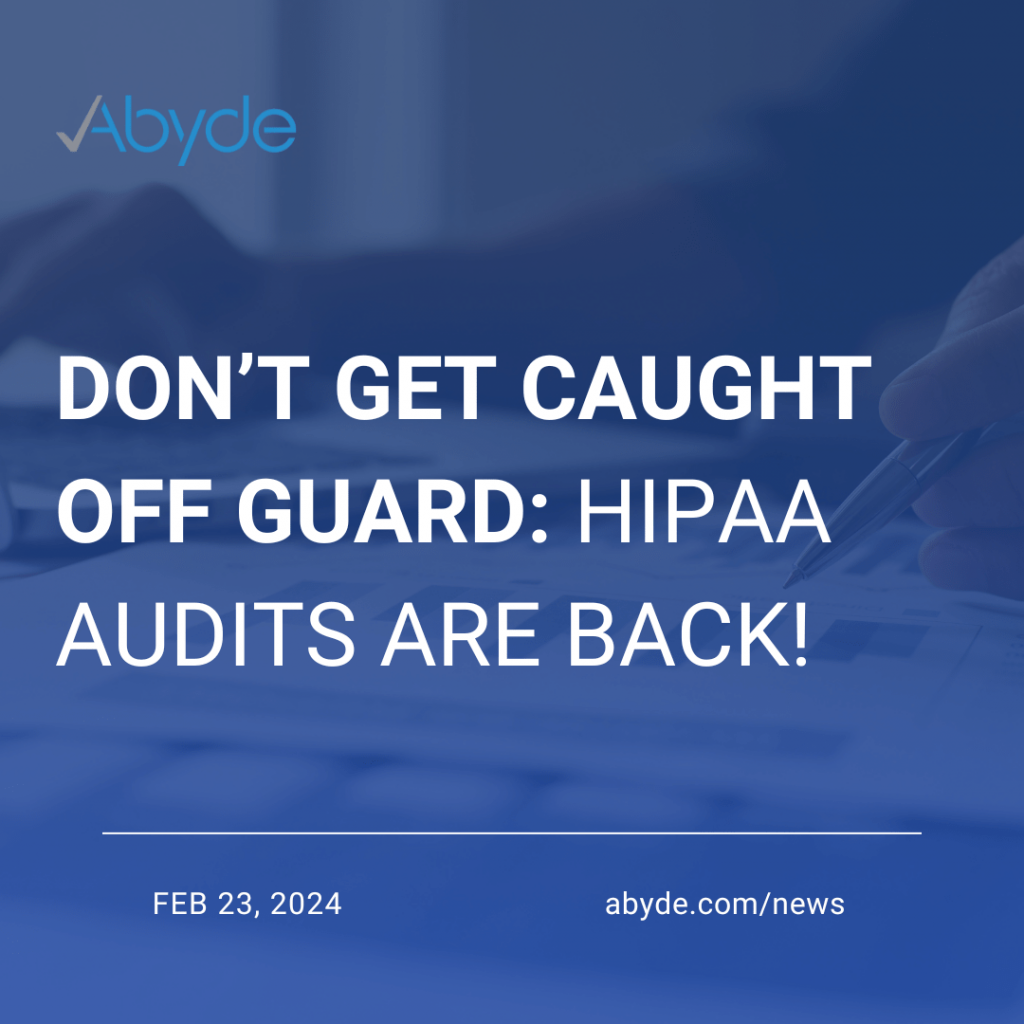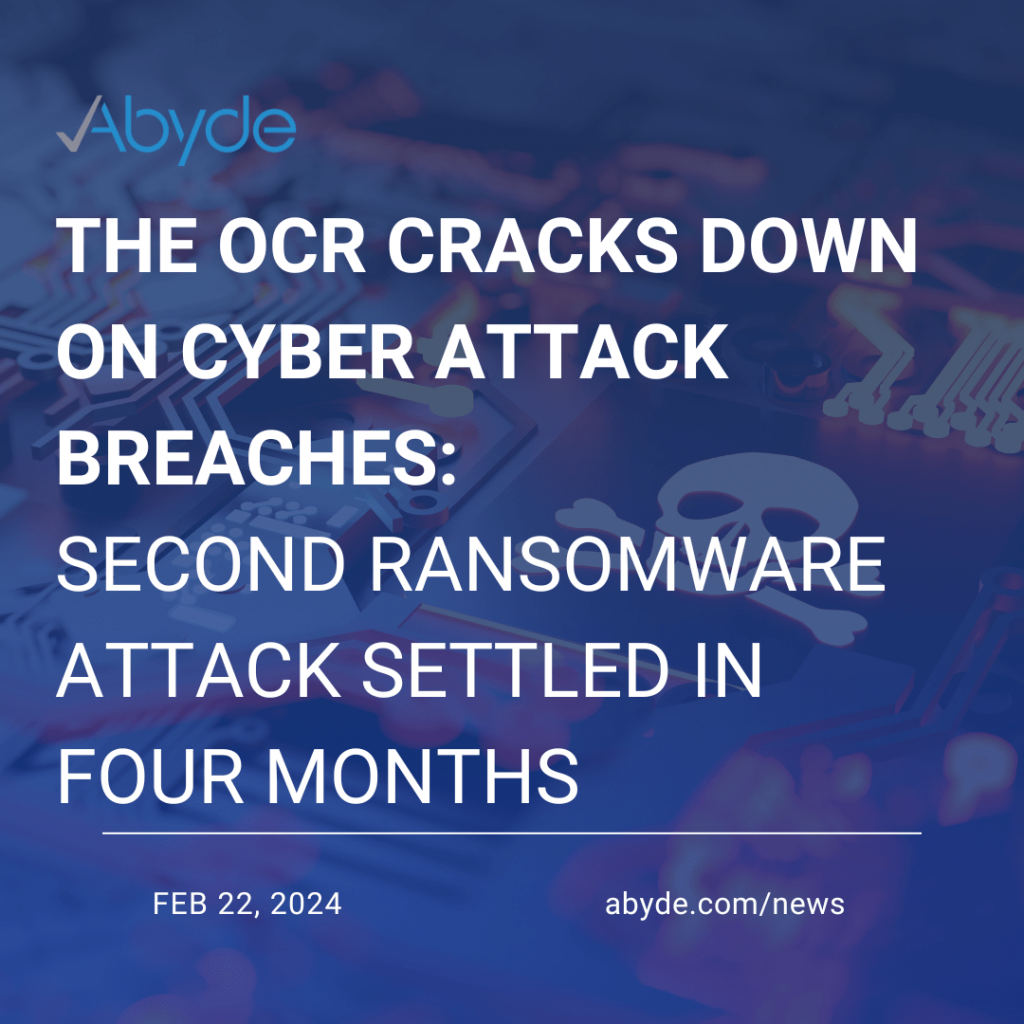March 12, 2024 Today, we’re taking you to compliance school. Don’t worry, there won’t be a test, so no need to study! Sometimes compliance can be complicated, and with so many specific words, it’s easy to feel overwhelmed. At Abyde, we believe in simplifying compliance, so we’re kicking it back to Kindergarten – more specifically, the ABCs. Here are the ABCs of compliance – see how many you already know! Audit – An audit is an examination of how compliant your practice currently is. The random HIPAA audit program will likely resume this year. Business Associate – A Business Associate is someone who handles Protected Health Information (PHI) and performs functions on behalf of a Covered Entity (both defined on this list!). Business Associates include a variety of fields, like medical equipment manufacturers, medical marketing teams, disposal companies, and more. Covered Entity – A Covered Entity directly works with sensitive patient data. This includes healthcare providers, health plans, and clearinghouses. Disaster Recovery Plan – A Disaster Recovery Plan is a required set of procedures to handle the effects of an unexpected event. This includes identifying potential risks, like different natural disasters, and more. Electronic Protected Health Information – Electronic Protected Health Information, or ePHI for short, is any PHI that is created, received, maintained, or transmitted in electronic form. Fraud – Fraud is deception to obtain something of value. HIPAA is in place to protect patients and prevent fraud by securing patient information and if these regulations are broken, there are consequences. GDPR – The GDPR, or General Data Protection Regulation, is essentially a HIPAA equivalent for our friends across the pond, or the European Union. The GDPR includes more than just healthcare, but does define the privacy of patient records. HIPAA – HIPAA, the thing you probably have heard of at least a million times (at least I know I have), or the Health Insurance Portability and Accountability Act, signed into law in 1996, protect the privacy and security of individuals’ health information and to establish standards for the electronic exchange of health information. Incident Response – An incident response is how you handle a situation. Under HIPAA, remember to document everything and report it in a timely manner. Joint Commission – Joint Commission is an accreditation agency that evaluates healthcare organizations. Joint Commission would be considered a Business Associate if they come into contact with Protected Health Information. Know your Patient – Know Your Patient, or KYP, is a way to identify a patient before any information is shared with the wrong person. Logs – Logs are prevalent in HIPAA and OSHA, and are just documentation. This includes things like asset logs, or documentation of the items your practice has, and things like a breach log, which includes an explanation of a breach (who, what, where, when, etc.) Minimum Necessary Standard – The minimum necessary standard is the protocol that the least amount of sensitive information about a patient should be shared. Notice of Privacy Practices – The Notice of Privacy Practices is a required notice to patients on how their information will be used and shared. OSHA – OSHA, or the Occupational Safety and Health Administration, is the government agency that ensures safe and healthy working environments for workers. PHI – Protected Health Information, or PHI, is identifiable information about a patient that is created and shared by a Covered Entity or Business Associate. This includes names, social security numbers, emails, medical record numbers, and more. Quality Management – Quality Management is the constant need to improve and monitor current processes and how to optimize patient care, employee safety, and more. Overall, how you can make your organization better for all involved. Ransomware – Ransomware is a form of malware that holds data for ransom, requiring practices to pay a ransom for access to PHI. Security Rule – The Security Rule is a component of HIPAA and sets the standard for all of the necessary safeguards a practice must have in place to protect PHI. Training – Training is the continuous learning and improvement of all employees (including the owner) of compliance regulations. Update Information – Updating information is very important in compliance, ensuring all information is up-to-date about your practice is key. For instance, have employees leave? Make sure you make a note of that in your policies and roles. With the Abyde software, we do that for you! Vulnerability Assessment – A Vulnerability assessment is a way to test cyber security frameworks to ensure that your system is secure. Whistleblower – A whistleblower is someone who calls out violations of compliance. Whistleblowers are to be protected and make our healthcare systems a safer place. X-ray Safety – X-ray safety precautions are vital, like any use of equipment. For instance, make sure proper protective equipment is worn, use shielding, and be aware of the position of the device. Yearly Risk Assessment – A Yearly Risk Assessment is a thorough evaluation of your practice’s compliance. With Abyde, we ask these questions throughout the year, ensuring your practice is compliant if you’re doing the right thing! Zero tolerance – There is Zero tolerance for breaking HIPAA or OSHA legislation. Whew! This one might have been a little bit longer than our traditional ABCs, but they’re all so important to keeping our patients and staff safe. To learn how you can keep your practice or business compliant, reach out to info@abyde.com or schedule a consultation here for Covered Entities, and here for Business Associates.
Yikes! My Files Are Kidnapped!: What is Ransomware?
March 7, 2024 Ransomware. Even the name sounds ominous! With the Change Healthcare ransomware attack, you might have heard a lot about ransomware in the news lately. While the effects of the attack are wreaking havoc on the healthcare system, you might be wondering what this notorious ransomware is all about. Well, you’ve come to the right place! We’re here to educate you on ransomware and how your practice or organization can be prepared for this cybercrime. What is it, exactly? Ransomware is a form of malware, or malicious software, that encrypts the files of a victim and requires a ransom to access files again. This is a very common way hackers infiltrate healthcare systems and over 4,000 ransomware attacks occur a day! If you’re confused about how ransomware works, here’s a simple example: Dan the Doctor was having an alright day, and then he got an email that went to his practice that he thought would turn it into the best day of his life! The email said he won 20 million dollars! All he had to do was click the link in the email to receive it. He clicked it as soon as possible, already dreaming of spending the rest of his life on the beaches of Hawaii. Spoiler alert: his day was going to get a lot worse. As he clicked the link, ransomware began its sinister magic: encrypting patients’ protected health information (PHI). He couldn’t believe what he did, putting his patients and his practice in jeopardy. Then, to get access to these files again, he had to pay thousands of dollars, or these files would be put online, putting his innocent patients even more at risk. His dreams of Hawaii turned into a very hurt wallet and his patients at risk. While you might think that could never happen to you: email scams, or phishing, are the most common way ransomware attacks are sent. Our simple example is just a story, but it happens often in the healthcare field. For example, the most recent major cybercrime is the ongoing Change Healthcare ransomware attack, in which they paid 22 million dollars in ransom! The OCR is also beginning to fine practices and organizations that do not take the proper precautions against ransomware attacks. The first ransomware attack fine was announced in October, costing the Business Associate (BA) $100,000 in HIPAA fines. What do I do? Now, while ransomware attacks have become extremely prevalent, with a 278% increase in ransomware breaches reported to the OCR, there are precautions you can take. Working with an IT company is key for your practice or business, with prevention being the first line of defense. This includes things like encrypting your files, keeping all software up-to-date, having firewalls, antivirus and more. Additionally, working with a compliance program like Abyde also lowers your risk. By identifying your vulnerabilities and enacting the right protocols, ransomware stands no match! For instance, password updating, proper data handling, access controls, and training, are all different barriers that help your practice or business. Also, if your practice is infected by ransomware, do not pay the ransom, get the infected device offline and off the network, report the breach to the OCR, and get IT experts to investigate the attack. To learn more about how your practice can stay compliant and secure against ransomware attacks, email us at info@abyde.com and schedule consultations for Covered Entities here, and Business Associates here.
Most Common HIPAA Violations by Dentists
March 6, 2024 Happy National Dentist’s Day! In honor of this special holiday, here’s a cheesy joke. What is a dentist’s favorite animal? A Molar Bear! Now, please stop cringing. We apologize for the bad joke, if we could, we would give all dentists who use our software a little … plaque. Ba Dum Tsss. Alright, now back to the more serious stuff. Dentists play an important role in our health, ensuring our smiles stay healthy and bright. However, they also have another major responsibility: following HIPAA regulations and protecting our protected health information (PHI). Sometimes, dentists slip up on their compliance responsibilities. Here are some of the most common HIPAA hiccups dentists face. Stolen Devices: One of the most common HIPAA violations for dentists is improper handling of stolen devices with PHI. In our tech-savvy world, computers and other devices play an imperative role in the dentist’s office, withholding information on patient’s personal information like billing, medical records, and more. If you have a device with electronically protected health information or ePHI, in your practice, make sure it is encrypted, or in other terms, very secure software that makes sure the right people are the only ones who can access it. Additionally, if a device is stolen, make sure remote deletion is set up correctly, letting you delete sensitive data from it with another device. ePHI in the wrong hands can be dangerous, but with the right precautions, you can keep patients safe. Disregardful Disposal: Another common HIPAA violation for dentists is improperly disposing of protected health information. From creation to disposal, PHi needs to be handled securely by your practice and complaint Business Associates (BAs). We’ve seen the after-effects of mishandled PHI, resulting in hefty fines. For example, a practice in Massachusetts improperly threw out PHI, throwing it in garbage bins outside the practice, and was fined over $300,000. Retaliating Responses: On top of managing your practice’s reputation in person, you have to manage it online. A very common HIPAA violation is disclosing PHI through social media and review sites. While I know it can be hard to not defend your practice, keeping your cool for sure feels way better than losing thousands of dollars to a fine. A California dentist practice learned the hard way by being fined $23,000 for disclosing PHI on Yelp in heated responses. The moral of the story? Keep it short, sweet, and offline. If you want to share a customer testimonial or image of a customer, ensure a media consent form is signed. Now, those are some of the most common HIPAA violations by dentists. Dentists have a lot on their plate, and sometimes, compliance falls on their list of priorities. That’s where Abyde comes in. We’re here to help make compliance simple for your dental practice, with a plethora of compliance resources. We pride ourselves on our efficiency, like turning the daunting Security Risk Analysis (SRA) into a minutes-long questionnaire, pinpointing everything you need to know for your practice. This results in a scorecard, with best practices to avoid HIPAA violations, including the ones mentioned above! The Abyde software also includes engaging training (that does not require you to shut down your practice for all to complete), dynamically generated policies and procedures, documents, like the media consent form, and more. We’re here so you can focus on what’s important, taking care of patients. Have a wonderful Dentist’s Day, and relax, let us take care of the compliance. For more information on how Abyde can simplify compliance for your practice, email info@abyde.com and schedule a consultation here.
Shredding for Secrecy: Why BA’s Proper Disposal Matters
March 1, 2024 Handling the complexities of HIPAA regulations can feel like walking a tightrope for healthcare providers. Every interaction with Protected Health Information (PHI) – from creation to disposal – carries potential risk. Fortunately, they’re not alone. Shredding companies, step into the crucial role of Business Associates (BAs), becoming vital partners in ensuring HIPAA compliance. When Disposal Companies Wear the BA Hat: Not all disposal companies fall under the BA umbrella. The key factor hinges on access and interaction with PHI. If a company directly receives, handles, or disposes of PHI on behalf of a covered entity like a hospital or clinic, they automatically become BAs. This means they’re bound to HIPAA legislation, becoming directly liable for the protection of patients’ data. Why Shredding BAs are Essential for HIPAA Compliance: Beyond just disposing of paper, disposal BAs bring critical expertise to the table: Paper-Thin Excuses: The Consequences of Improper Disposal The consequences of improper disposal of PHI can be severe. For instance, the New England Dermatology and Laser Center was fined over $300,000 due to improper disposal of PHI, and having health information in a garbage bin in their parking lot. Data security isn’t a solo act. Recognizing disposal BAs as active partners in the HIPAA compliance journey strengthens the entire healthcare ecosystem. By choosing trusted BAs and fostering open communication, covered entities can leverage their expertise and navigate the ever-evolving regulatory landscape with greater confidence. For Business Associates, being compliant is beyond good business practices, it’s upholding your commitment to patients’ data. Abyde’s newest software, HIPAA for Business Associates is here to simplify compliance for your organization. Abyde’s software includes training, security risk analysis, a BA and CE portal, and many more resources to assist your organization. To learn more about compliance for your organization, email info@abyde.com and schedule a demo today here.
Make the Most of Your Extra Day: The First Step of Compliance
February 29, 2024 Happy Leap Day! With the extra 24 hours, what do you plan to do? First, if you haven’t, remember to report your small breaches to the OCR today, but what else? I know you might say do nothing and sit on the couch later, and while that sounds great, we have some better ideas for you. We at Abyde believe in self-improvement and betterment, appreciating every day and making an impact. This once-in-every-four-year occasion is an opportunity to do something new and start a task you’ve been putting off. For many, this could be compliance. Compliance software is key, knowing your practice is prepared if used correctly. Investing in compliance software is a small cost compared to how expensive violations can be, with the smallest HIPAA fines costing $137 and the least expensive OSHA fines costing $1190. While perfect compliance can’t be achieved in one day (if it could, we wouldn’t be here!), by taking the first step today and using Abyde’s software, compliance is easily within your reach, with us simplifying the process and being with you every step of the way. Compliance is a continuous process, but it requires the first step to build that culture of compliance for your practice or organization. A culture of compliance takes time, training your staff, having all understand the importance of compliance, the precautionary measures that need to be taken to secure Protected Health Information (PHI), and ensuring a safe working environment for all. We at Abyde know how precious your time is, so we offer quick 15 to 20-minute demos and consultations. Additionally, Abyde prides itself on how we make the compliance process efficient and fun. Complete the once daunting Security Risk Analysis, or SRA, in minutes with our intuitive and simple questions. Drastically cut down on time with our dynamically generated Policies & Procedures, having custom documentation created for you in seconds. Learn from our numerous resources in the software on what it means to be compliant. If you have any questions, experience white-glove service from our team of compliance experts, only a short call or message away. While an extra day might feel insignificant, all it takes is that first step on the journey to compliance. We hope you enjoy your extra day, and make that first step by scheduling a short demo or consultation (Business Associates, click here, please!) with our experts today. If you still have questions, email us at info@abyde.com, or call 1.800.594.0883.
What You Need to Know: Major Changes to 42 CFR Part 2
February 28, 2024 For practices offering treatment for a substance use disorder (SUD), some major compliance changes have been rolled out. The Substance Abuse and Mental Health Services Administration, or the much easier-to-remember SAMHSA, and the Office of Civil Rights, or OCR, have announced changes to 42 CFR Part 2. 42 CFR Part 2 is a document that rules how substance use disorder patient records need to be handled. Some major changes include: One OK: A single consent is valid for all future uses, forgoing repeated permissions and simplifying the process for your practice. Sharing with Care: Information about a patient can be shared with public health authorities without specific consent. However, the documents need to be revised to make the patient anonymous. Enforcement Streamlined: Previously, 42 CFR Part 2 had separate penalties. Now, it adopts the same civil and criminal enforcement as HIPAA violations, ensuring consistency and clear expectations. Breach Notification and Patient Notice: Will follow the same Breach Notification Rule and Patient Notice of Privacy Practices as standard HIPAA requirements. Safe Harbor: The Safe Harbor rule in the 42 CFR Part 2 creates a limit on the liabilities investigative agencies that follow proper procedures can face. So, simply put, if an investigative agency has accessed protected health information about someone in substance abuse treatment by following the proper procedures, they will be protected. What this means for your Practice If you work for a practice that offers treatment for substance use disorder, knowing the changes to this legislation is imperative. With Abyde, we’re here for you to simplify compliance, with our revolutionary software keeping you up to date and accountable. Review your organization’s risks and vulnerabilities with our variety of resources, including our state-of-the-art Security Risk Analysis (SRA) which can be completed in minutes. To learn more about how your practice can be compliant, email us at info@abyde.com and schedule a consultation today.
Change Healthcare Breach: A Long Road Ahead
April 26, 2024 It’s Friday! It’s time to unwind and not think about work for a few days… except for the Change Healthcare breach, that party’s not over. Let’s get you caught up. As we’ve kept you updated with the latest updates in the Change Healthcare Breach on the blog and our social media with our This Week in Compliance (TWIC) series, there have been some significant updates in this compliance catastrophe. Accompanied by our This Week in Compliance (TWIC) video, let’s dive into the latest on Change Healthcare breach. Double Trouble Sometimes, two isn’t better than one. Change Healthcare received a double scoop of trouble, and, unlike a sundae with delicious hot fudge, this came with two servings of ransom demands! Change Healthcare is no stranger to ransom demands, paying $22 million in Bitcoin to the BlackCat hacking group. This is just the beginning of the story. Another hacking group, RansomHub, announced they had several terabytes of Protected Health Information (PHI). For some perspective, here’s a simple explanation. A terabyte contains over 5 million document pages! Think about how many patients a leak of that information could impact! At first, there was skepticism about whether these RansomHub bullies truly had access to the information, bluffing for a ransom payment. Unfortunately, RansomHub does have this PHI, sharing over 20 victims’ health information to prove a point. While we don’t know how much it is, we’re willing to bet it’s much more than an Abyde subscription. Pretty Penny for PHI This breach is costing the UnitedHealth Group over a billion dollars! These costs impact not only the medical giant but all of the practices and hospitals that rely on the organization to process prescriptions. According to the American Hospital Association, 94% of all hospitals report financial impact, with 33% costing the hospitals more than half of their revenue! In addition to the monetary costs of the attack, the UnitedHealth group has to repair its shattered reputation. The UnitedHealth Group is currently caught in the crosshairs of national-level legal proceedings, with Congress beginning hearings on the attack. Shockingly, UnitedHealth Group was not in attendance, but the CEO, Andrew Witty, is due for an appearance at the beginning of May. What’s next? This breach is a serious reminder that no matter how big, or small, your practice is, data breaches can happen to anyone. It’s important to stay proactive and address your vulnerabilities to protect PHI. As we continue to discover the extent of the attack, even if your practice didn’t cause the breach, Covered Entities must notify affected patients according to the Breach Notification Rule. For our Abyde users, check out the What’s New section for guidance on notifying your patients. The HHS also has a FAQ section on its website regarding the breach. To learn more about how to keep your practice safe, schedule a consultation with a compliance expert here.
Leap into Action: Important Data Breach Reporting Deadline Approaches
February 26, 2024 Happy Leap Year! Now, let’s celebrate the once-in-every-four-years event with the most exhilarating and entertaining activity: notifying the OCR of small breaches your practice faced in 2023. Alright, I’m kidding I’m kidding, while reporting these breaches might not be the most exciting activity, it is very important to notify the OCR of these breaches to ensure proper procedure was followed when things didn’t go as planned. This notification to the OCR is due 60 days after the end of the following year, according to the Breach Notification Rule. So, for 2024, it will be February 29th or Leap Day. So, what is a small breach? You might be asking, what constitutes a small breach? Thankfully, the OCR has specified this for us, and it’s any breach that affects 500 or fewer patients. Anything more than this requires faster reporting, needing to notify the OCR of the breach within 60 days of the discovery of the breach. While smaller breaches don’t need to be reported to the OCR as quickly, patients must be aware of their data being affected in a breach, and patients must be notified within 60 days of the practice finding the breach, or even sooner depending on the state. So, how do I report my small breaches to the OCR? Another great question! Once again, the OCR has a reporting system in place online here. Each small breach has to be reported separately through the website. Abyde makes breach reporting easy, with our HIPAA breach logs, which will allow you to log when you experience a breach in your software. After filling out the breach log, we have a Breach Risk Assessment for you to take, and will then generate a report with all the information you need for the OCR breach report. If you want some help filling out the breach report, you can turn to us, your compliance crew. For Abyde users, call us at 1-800-594-0883 or hit the Help! Alarm button under the gear icon in your Abyde software. We’ll get connected with you immediately and help you navigate the breach. Then, just make sure you notify the OCR by the due date for those smaller breaches! So, what else do I need to do? I’m glad that you’re still interested! Having assigned roles when breaches occur. The reporting of breaches usually falls under the HIPAA Compliance Officer’s list of responsibilities. Having a designated HIPAA Compliance Officer, and in general, having assigned roles in order when a breach or disaster occurs ensures accountability. So, what now? Make sure that you have all of your small breaches reported to the OCR by February 29th, 2024. Abyde is here to make this process easy with our easy-to-use software. To learn more about how Abyde simplifies compliance, reach out to info@abyde.com or schedule a demo here.
Don’t Get Caught Off Guard: HIPAA Audits are Back!
February 23, 2024 They’re Baaaaaack! And in this case, not the poltergeists in the 80s classic, but the Office For Civil Rights (OCR). The OCR shared some significant news, announcing their plans to reintroduce their random HIPAA audits program. The last time this program was in place was in 2016 – 2017, with over 200 Covered Entities and Business Associates audited to ensure HIPAA compliance. Before this program is officially implemented again, the OCR is surveying past audit participants, and hearing their feedback before random audits begin. However, Director of the OCR, Melanie Fontes Rainer, confirmed the audits would resume this year, “OCR intends to initiate audits of HIPAA-regulated entities later this year. These audits can assist regulated entities in improving their HIPAA compliance and their protection of health information.” The audits revealed eye-opening shortcomings of CEs and BAs, with Paul Hales of Hales Group describing that “86% of covered entities and 83% of business associates failed the risk analysis audit, and 94% of CEs and 88% of BAs failed the risk management audit”. Thankfully, this news doesn’t have to be like a horror movie if you’re proactive and take compliance seriously. What does this mean for you? While random HIPAA audits might seem very nerve-wracking for your practice or organization, with the proper tools, you can be easily prepared. These audits will help all in healthcare, highlighting the importance of being compliant and keeping patients’ data safe. That’s why Abyde is here to help. Our software simplifies compliance, allowing your practice to focus on what matters most, taking care of patients, or in the case of Business Associates, running your business. To learn more about how you can be prepared for the random OCR HIPAA audits, email us at info@abyde.com or schedule a compliance consultation below. MEDICAL PRACTICES: SCHEDULE CONSULTATION BUSINESS ASSOCIATES: SCHEDULE CONSULTATION
The OCR Cracks Down on Cyber Attack Breaches: Second Ransomware Attack Settled in Four Months
February 22, 2024 Well, the Office of Civil Rights (OCR) did it again. In the past four months, two ransomware cyber attack cases have been settled, resulting in hefty fines, yikes! While the first ruling affected a Business Associate with a major fine, this breach impacted a Covered Entity. In February 2019, Green Ridge Behavioral Health in Maryland filed a breach report that all of their files on patients were encrypted with ransomware, resulting in over 14,000 patients’ data being compromised. That’s a lot of people! As the name suggests, ransomware is a cybercrime where data is held for ransom. Users are unable to access data/files till the ransom is paid. It is a malicious crime that is extremely prevalent in healthcare, with a 264% increase over the past five years in large breaches reported to the OCR. In their investigation, the OCR found potential violations of the HIPAA Privacy and Security Rules from before and right up until the breach. In their variety of violations, some other major misses included: As a result, Green Ridge Behavioral Health was fined $40,000 and will now be monitored by the OCR for the next three years. That’s a long time and a lot of money for a practice that could have avoided this situation with the right compliance solution. That’s where Abyde steps in. Cyber attacks are unfortunately common in healthcare, accounting for 79% of the large breaches reported to OCR. We’ve now seen a pattern of the OCR ruling on ransomware cases, cracking down on practices and organizations that are not prepared for a cyber attack. The OCR is not messing around, and these fines are a clear example. Thankfully, with Abyde, we make the journey to compliance simple. The Abyde software resolves many of the reasons why practices and organizations get fined. You can complete our intuitive Security Risk Analysis in minutes, being able to see what your practice needs to do to be compliant in a flash. Abyde also has engaging training, with interactive activities and videos, all with entertaining themes, to keep the user interested (yes, you read that right). We also have a portal that allows you to easily manage all of your agreements with Business Associates, digitally signing and storing them in the software. What’s the cherry on top? We will remind you when these agreements are close to expiring, being your compliance crew so you can focus on running your practice. We have a variety of resources for practices of any size to use, like dynamically generated policies and procedures, allowing you to finally ditch the dusty HIPAA binder, HIPAA logs, our team of friendly compliance experts is always a call (or message!) away, and much more. Why wait for a compliance disaster? Email us at info@abyde.com and schedule a demo of our revolutionary software here.
